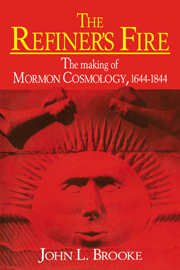Book contents
- Frontmatter
- Contents
- List of Illustrations
- List of Maps
- Preface
- Part I A Prepared People
- 1 Dreams of the Primal Adam
- 2 The True Spiritual Seed
- 3 Something of Our Ancestors
- Part II Hermetic Purity and Hermetic Danger
- Part III The Mormon Dispensation
- Appendix The Sectarian and Hermetic Circumstances of Mormon Origins in Vermont and New York
- Abbreviations Used in Notes
- Notes
- Index
1 - Dreams of the Primal Adam
Published online by Cambridge University Press: 30 October 2009
- Frontmatter
- Contents
- List of Illustrations
- List of Maps
- Preface
- Part I A Prepared People
- 1 Dreams of the Primal Adam
- 2 The True Spiritual Seed
- 3 Something of Our Ancestors
- Part II Hermetic Purity and Hermetic Danger
- Part III The Mormon Dispensation
- Appendix The Sectarian and Hermetic Circumstances of Mormon Origins in Vermont and New York
- Abbreviations Used in Notes
- Notes
- Index
Summary
[I]t shall be done unto them all things whatsoever my servant hath put upon them, in time and through all eternity; and shall be of full force when they are out of the world; and they shall pass the angels and the gods, which are set there, to their exaltation and glory in all things, as hath been sealed upon their heads, which glory shall be a fulness and a continuation of the seeds forever and ever.
Then shall they be gods, because they have no end; therefore shall they be from everlasting to everlasting, because they continue; then shall they be above all, because all things are subject to them. Then shall they be gods, because they have all power, and the angels are subject to them.
Revelation of Joseph Smith, the Mormon prophet, recorded July 12, 1843, at Nauvoo, IllinoisThe story of the mormons, the Latter-day Saints, begins with Joseph Smith Jr. In the spring of 1829 this young man of twenty-four years announced a new dispensation to the peoples of the Burned-over District of the state of New York, a countryside recently settled by New England migrants and now swept by the fires of evangelical religion. Announcing that his revelations restored the primitive apostolic church and opened the Kingdom of God on earth, Smith claimed to have brought forth not simply a new church but a new dispensation, fully equivalent to the dispensations of Moses and Christ. Mormonism, in his vision, would some day sweep away all other faiths as the universal true religion.
- Type
- Chapter
- Information
- The Refiner's FireThe Making of Mormon Cosmology, 1644–1844, pp. 3 - 29Publisher: Cambridge University PressPrint publication year: 1994



